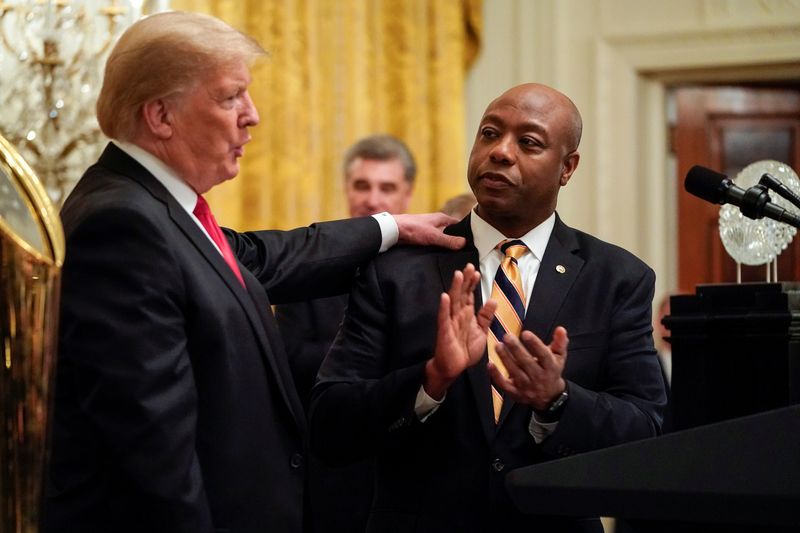By Gram Slattery
CONCORD, New Hampshire (Reuters) -U.S. Senator Tim Scott, who had campaigned against Donald Trump for the Republican presidential nomination, endorsed his former rival at a rally in New Hampshire on Friday night, dealing a blow to Trump's top remaining primary competitor, Nikki Haley.
The move by Scott comes just four days before the pivotal Republican nominating contest in New Hampshire, in which Trump is facing off against Haley, a former South Carolina governor who first appointed Scott to the U.S. Senate.
Only Florida Governor Ron DeSantis, who has largely written off New Hampshire to challenge Haley in her home state of South Carolina, remains in the three-way contest for the nomination.
Haley is trailing Trump by 14 points in New Hampshire, according to an average of polls maintained by polling analysis website 538. She is feverishly trying to close the gap, as the state is widely seen as one of her best shots to score a win off the former president and keep her campaign hopes alive.
Speaking before hundreds of cheering supporters in Concord, many of whom waited several hours outside in 15 degree Fahrenheit temperatures, Scott listed several reasons why he said the country needed another Trump term, arguing he would lower taxes and unite the country.
"That's why I came to the very warm state of New Hampshire to endorse the next president of these United States, Donald Trump," Scott shouted.
Scott, the lone Black Republican in the Senate, is the latest conservative U.S. lawmaker to endorse Trump, who won Iowa's caucus on Monday by a historic margin.
After Scott spoke, Trump briefly acknowledged his endorsement, before bashing Haley and Democratic President Joe Biden, who he is likely to face in a general election rematch in November.
As in some previous campaign stops, he also ramped up his criticism of New Hampshire's Republican governor, Chris Sununu, who endorsed Haley in December and has been campaigning heavily with her in recent weeks.
"I think your governor sucks," Trump said to cheers.
In 2012, Haley appointed then U.S. House Representative Scott to replace retiring U.S. Senator Jim DeMint, making him the first Black Republican in the chamber since 1979.
Now the nation's top elected Black Republican in a party whose base is majority white, Scott's endorsement could be critical in a contest where race has become a dominant theme.
Trump's team and Scott's team had been in contact before the endorsement for several weeks, according to multiple people briefed on the talks.
The senator had launched a presidential primary bid of his own earlier in the year, portraying himself as someone who could unify a politically divided country, but he dropped out in November after failing to gain traction in the polls and turning in a series of lackluster debate performances.
Trump has stepped up his attacks on Haley, including racial language mocking her Indian heritage, while Haley has been criticized for not citing slavery as the cause of the U.S. Civil War and for this week saying the United States has never been a racist country.
Scott, meanwhile, has largely managed to avoid drawing Trump's ire despite some previous criticism of the former president, including over race.

In 2017, Scott said Trump had "compromised his moral authority to lead" after the then-president cited "very fine people on both sides" of a white nationalist rally in Charlottesville where one woman was killed.
Earlier on Friday, Haley scored the endorsement of the Republican governor of Vermont, Phil Scott. While a much lower-profile figure at the national level, Scott is well-known in much of New Hampshire, which shares a border with Vermont.